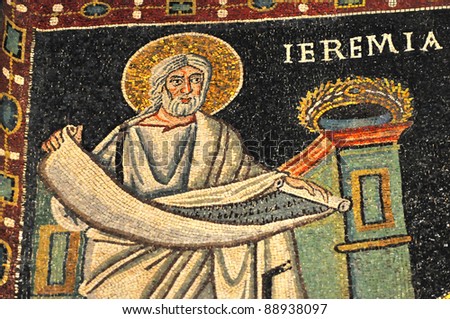- Matthew 27:50-54
Upon the death of Jesus on the cross, several extraordinary occurrences took place that testified that this was the death of no mere man: the veil of the temple was torn open, an earthquake shook the ground, the rock of the mountains of the area split, and some of the local dead rose from their graves (the last, though described here, apparently actually coincided with Christ's resurrection on Sunday following). Such a fundamental reaction by the creation would surely be expected to attract the attention of many to the significance of the event. In fact, here in our passage, even pagan Romans were moved to acknowledge the Godhead of the man they themselves had crucified.
Who was unmoved? The very leaders of the Jews who had harried Jesus to His death. In fact, we read of them, plotting against His followers, in Acts 4. In verses 5-6, we see them gathered: "On the next day [after Peter and John had testified before the Jewish crowds] their rulers and elders and scribes gathered together in Jerusalem, with Annas the high priest and Caiaphas and John and Alexander, and all who were of the high-priestly family." What was their decision? Verses 16-17: "'What shall we do with these men? For that a notable sign has been performed through them is evident to all the inhabitants of Jerusalem, and we cannot deny it. But in order that it may spread no further among the people, let us warn them to speak no more to anyone in this name.'" So, even while acknowledging the significance of the events that occurred before them, they do not repent, but rather turn to subterfuge to suppress the very truth that they recognize.
16th-Century Scottish Presbyterian commentator Robert Rollock says of this passage, "It is a wonderful thing to see, that they who had judgment and understanding, and who had read all the prophecies of the Messiah to come, got no sense, yet a silly multitude ["silly" in the historical sense of simple and uneducated, referring to the five thousand of verse 4] gets some sight and sense." In other words, those with the most biblical knowledge, who should have been the first to acknowledge the messianic role of Jesus, instead hardened their hearts against Him, while those who had been most in spiritual ignorance embraced Him. Jesus anticipated this, when He said (Luke 10:21), "I thank you, Father, Lord of heaven and earth, that You have hidden these things from the wise and understanding and revealed them to little children; yes, Father, for such was Your gracious will." And Paul looked back to these events, when he said (I Corinthians 1:27), "God chose what is foolish in the world to shame the wise..."
Rollock responds with this admonition, which should still be heard in our day, even after more than four-hundred years: "Whosoever thou are who opposest thee to the brightness of the Gospel, thou crucifiest the Lord of Glory; and as it shall be laid to the charge of the high priests and Pharisees, and of Pilate and Herod, in that great day, that they crucified Jesus Christ, so it shall be laid to thy charge, and thou shalt be as guilty of his blood as they. Woe to that soul which will resist that Word and the Holy Spirit! Woe shall be to the great men in this land who against conscience conspire against Christ, religion, and their native country [i.e,. by opposing the spread of the Gospel], for wrath and vengeance remaineth for them, if they leave not off this unhappy course."


















